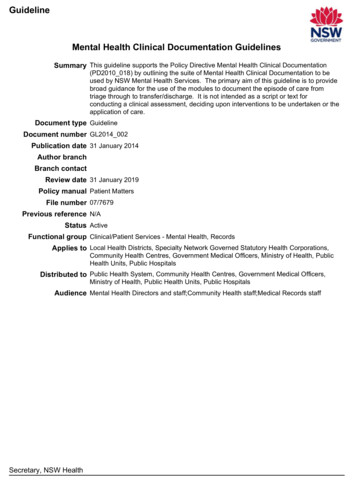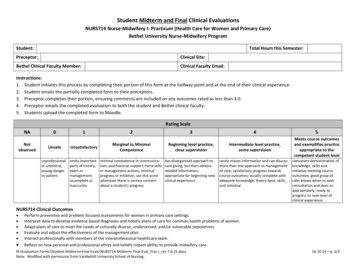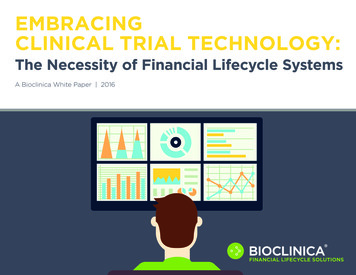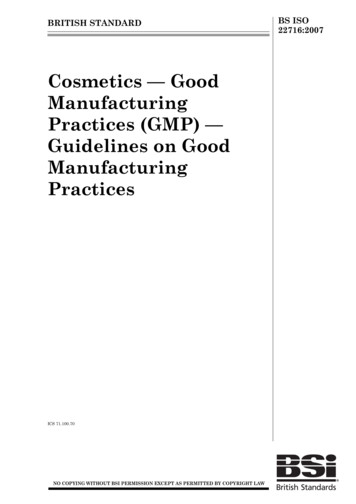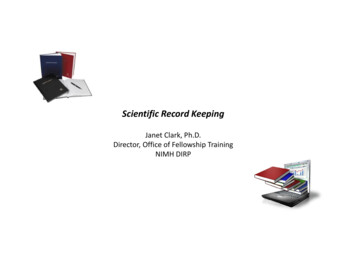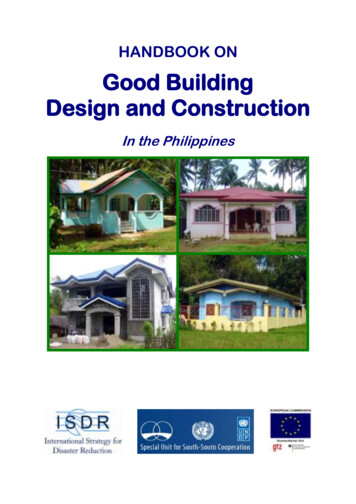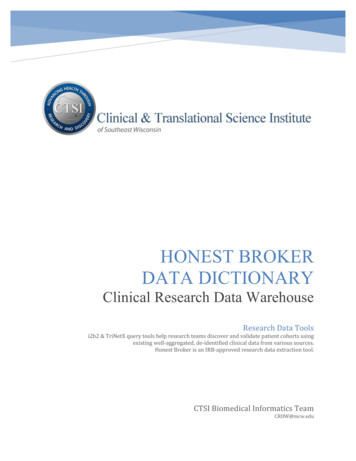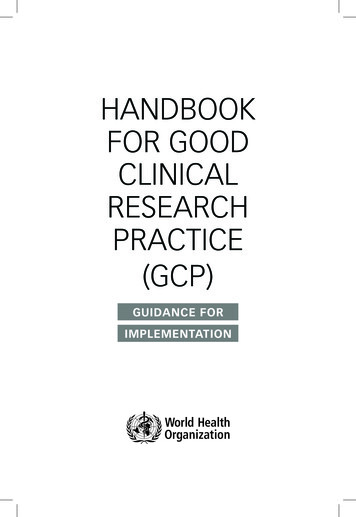
Transcription
HANDBOOKFOR GOODCLINICALRESEARCHPRACTICE(GCP)GUIDANCE FORIMPLEMENTATION
WHO Library Cataloguing-in-Publication DataHandbook for good clinical research practice (GCP):Guidance for implementationISBNThe World Health Organization welcomes requests for permission to reproduce ortranslate its publications, in part or in full. Applications and enquiries should be addressed to the Office of Publications, World Health Organization, Geneva, Switzerland, which will be glad to provide the latest information on any changes made to thetext, plans for new editions, and reprints and translations already available. World Health Organization 2002Publications of the World Health Organization enjoy copyright protection in accordance with the provisions of Protocol 2 of the Universal Copyright Convention. Allrights reserved.The designations employed and the presentation of the material in this publicationdo not imply the expression of any opinion whatsoever on the part of the Secretariatof the World Health Organization concerning the legal status of any country, territory, city or area or of its authorities, or concerning the delimitation of its frontiers orboundaries.The mention of specific companies or of certain manufacturers’ products does notimply that they are endorsed or recommended by the World Health Organization inpreference to others of a similar nature that are not mentioned. Errors and omissionsexcepted, the names of proprietary products are distinguished by initial capital letters.Designed by minimum graphicsPrinted in
ContentsPreamble1Introduction3Overview of the Clinical Research Process8WHO Principles of GCP21Principle 1: Ethical Conduct21Principle 2: Protocol27Principle 3: Risk Identification35Principle 4: Benefit-Risk Assessment42Principle 5: Review by Independent Ethics Committee/Independent Review Board48Principle 6: Protocol Compliance54Principle 7: Informed Consent59Principle 8: Continuing Review/Ongoing Benefit-RiskAssessment72Principle 9: Investigator Qualifications82Principle 10: Staff Qualifications87Principle 11: Records92Principle 12: Confidentiality/Privacy103Principle 13: Good Manufacturing Practice110Principle 14: Quality Systems115References:121Documents on CD121Other documents cited in the Handbook122Related documents123National Good Clinical Practice and Other Guidelines124Acknowledgements125 iii
PreambleClinical research is necessary to establish the safety and effectiveness of specific health and medical products and practices. Much ofwhat is known today about the safety and efficacy of specific products and treatments has come from randomized controlled clinicaltrials1 that are designed to answer important scientific and healthcare questions. Randomized controlled trials form the foundation for“evidence-based medicine”, but such research can be relied upononly if it is conducted according to principles and standards collectively referred to as “Good Clinical Research Practice” (GCP).This handbook is issued as an adjunct to WHO’s “Guidelines for goodclinical practice (GCP) for trials on pharmaceutical products” (1995),and is intended to assist national regulatory authorities, sponsors,investigators and ethics committees in implementing GCP for industrysponsored, government-sponsored, institution-sponsored, or investigator-initiated clinical research. The handbook is based on majorinternational guidelines, including GCP guidelines issued subsequentto 1995, such as the International Conference on Harmonization (ICH)Good Clinical Practice: Consolidated Guideline and is organized as areference and educational tool to facilitate understanding and implementation of GCP by: describing the clinical research process as it relates to health andmedical products, and identifying and explaining each of the activities that are common to most trials and the parties who are ordinarily responsible for carrying them out; linking each of these processes to one or more Principle(s) of GCPwithin this Handbook;1These trials assign trial subjects to treatment or control groups using an element ofchance to determine the assignments in order to reduce bias. 1
explaining each GCP Principle and providing guidance on how eachPrinciple is routinely applied and implemented; directing the reader to specific international guidelines or otherreferences that provide more detailed advice on how to complywith GCP.2 H A NDBOO K FO R GOO D CL INICA L RESE A RCH PR ACT ICE
IntroductionGood Clinical Research Practice (GCP) is a process that incorporatesestablished ethical and scientific quality standards for the design,conduct, recording and reporting of clinical research involving theparticipation of human subjects. Compliance with GCP providespublic assurance that the rights, safety, and well-being of researchsubjects are protected and respected, consistent with the principlesenunciated in the Declaration of Helsinki and other internationallyrecognized ethical guidelines, and ensures the integrity of clinicalresearch data. The conduct of clinical research is complex and thiscomplexity is compounded by the need to involve a number of different individuals with a variety of expertise, all of who must performtheir tasks skillfully and efficiently.The responsibility for GCP is shared by all of the parties involved,including sponsors, investigators and site staff, contract researchorganizations (CROs), ethics committees, regulatory authorities andresearch subjects.BackgroundFor the purposes of this handbook, a general definition of humanresearch is:“Any proposal relating to human subjects including healthy volunteers that cannot be considered as an element of acceptedclinical management or public health practice and that involveseither (i) physical or psychological intervention or observation, or(ii) collection, storage and dissemination of information relating toindividuals. This definition relates not only to planned trials involving human subjects but to research in which environmental factorsare manipulated in a way that could incidentally expose individuals 3
to undue risks.” (World Health Organization, Governance, rules andprocedures, WHO Manual XVII).Before medical products can be introduced onto the market or intopublic health programmes, they must undergo a series of investigations designed to evaluate safety and efficacy within the parametersof toxicity, potency, dose finding, and field conditions. Full information must be documented on therapeutic indications, method ofadministration and dosage, contraindications, warnings, safetymeasures, precautions, interactions, effects in target populationsand safety information.During the clinical research and development process, most medicalproducts will only have been tested for short-term safety and effi cacy on a limited number of carefully selected individuals. In somecases, as few as 100, and rarely more than 5000 subjects will havereceived the product prior to its approval for marketing. Given thesecircumstances and because the decision to allow a new product onthe market has such broad public health significance, the clinical trialprocess and data must conform to rigorous standards to ensure thatdecisions are based on data of the highest quality and integrity.In the early 1960s, widespread concern about the safety and controlof investigational drugs and the clinical research process developedamong members of the medical profession, the scientific community, regulatory authorities, and the general public. In 1968, WHOconvened a Scientific Group on Principles for Clinical Evaluation ofDrugs. The Scientific Group was charged with reviewing and formulating principles for clinical evaluation of drug products, whether newor already marketed, including considerations for new indications ordosage forms for marketed products and new combination products.In 1975, another WHO Scientific Group was convened to specificallyconsider all aspects of the evaluation and testing of drugs and to formulate proposals and guidelines for research in the field of drug development. These reports formed the basis for WHO’s “Guidelines forgood clinical practice (GCP) for trials on pharmaceutical products”,published in 1995, as well as many national and international guidelines that have subsequently been developed, including:4 H A NDBOO K FO R GOO D CL INICA L RESE A RCH PR ACT ICE
International Conference on Harmonization (ICH) E6, “Good ClinicalPractice: Consolidated Guideline” (1996) International Standards Organization (ISO), “Clinical investigationof medical devices for human subjects, Part I (General requirements) and Part 2 (Clinical investigation plans) (2001) Pan American Health Organization (PAHO). Pan American Networkon Drug Regulatory Harmonization (PANDRH). “Good Clinical Practices: Document of the Americas” (2005)The conduct of clinical research in accordance with the principlesof GCP helps to ensure that clinical research participants are notexposed to undue risk, and that data generated from the researchare valid and accurate. By providing a basis both for the scientific andethical integrity of research involving human subjects and for generating valid observations and sound documentation of the findings,GCP not only serves the interests of the parties actively involved inthe research process, but also protects the rights, safety and wellbeing of subjects and ensures that investigations are scientificallysound and advance public health goals.Objectives of this handbookThe objectives of this current WHO Handbook for GCP include the following: To support and promote the achievement of a globally applicableunified standard for the conduct of all clinical research studies onhuman subjects; To provide an overview and practical advice on the application andimplementation of internationally accepted principles for GCP andclinical research in human subjects; To provide an educational and reference tool for anyone interestedin, or intending to become or already actively engaged in, clinicalresearch by providing the necessary background and insight intothe reasons for the requirements of GCP and their efficient application;IN T RO DUCT IO N 5
To assist editors in evaluating the acceptability of reported research for publication, and regulators in evaluating the acceptability of any study that could affect the use or the terms of registrationof a medical product.This handbook can be adopted or referenced by WHO MemberStates. Where national regulations or requirements do not exist orrequire supplementation, relevant regulatory authorities may designate or adopt these GCP principles and standards. Where national oradopted international standards are more demanding than WHO GCP,the former should take precedence.Guidance on various aspects of clinical research is also availablefrom several other national and international bodies such as, theInternational Conference on Harmonization (ICH), the InternationalStandards Organization (ISO), and the Council for International Organizations of Medical Sciences (CIOMS), the European Agency forthe Evaluation of Medicinal Products (EMEA), and the United StatesFood and Drug Administration (FDA). (See References)Scope of this handbookThis handbook defines fourteen principles of GCP, and provides guidance and assistance in the application and implementation of theseprinciples by all parties involved in the clinical research process. Indescribing each principle, the handbook articulates the researchprocesses and systems that need to be in place, and within these,the roles and responsibilities of various stakeholders (notably sponsors, investigators, ethics committees, and regulatory authorities)involved in the conduct of health and clinical research studies.To the extent possible, the principles of GCP should generally apply toall clinical research involving human subjects, and not just researchinvolving pharmaceutical or other medical products. Included hereare: studies of a physiological, biochemical, or pathological process,or of the response to a specific intervention – whether physical,chemical, or psychological – in healthy subjects or in patients;6 H A NDBOO K FO R GOO D CL INICA L RESE A RCH PR ACT ICE
controlled studies of diagnostic, preventive or therapeutic measures, designed to demonstrate a specific generalizable responseto these measures against a background of individual biologicalvariation; studies designed to determine the consequences for individualsand communities of specific preventive or therapeutic measures; studies concerning human health-related behaviour in a variety ofcircumstances and environments; studies that employ either observation or physical, chemical, orpsychological intervention. Such studies may generate records ormake use of existing records containing biomedical or other information about individuals who may or may not be identifiable fromthe records or information. The use of such records and the protection of the confidentiality of data obtained from those recordsare discussed in the “International Guidelines for Ethical Review ofEpidemiological Studies” (CIOMS, 1991, currently being updated).Although some principles of GCP may not apply to all types of research on human subjects, consideration of these principles isstrongly encouraged wherever applicable as a means of ensuringthe ethical, methodologically sound and accurate conduct of humansubject’s research.IN T RO DUCT IO N 7
Overview of the clinicalresearch processThis section outlines key activities involved in the conduct of a clinical trial. This shows one possible sequence in which these activitiesmay occur; other sequences (e.g., simultaneous completion of oneor more activities) are also acceptable. Multiple parties are responsible for the success of these activities and procedures; the individualresponsibilities of investigators, sponsors, ethics committees, andregulatory authorities will be the topic of subsequent sections of thisHandbook.Key trial activities include:1. Development of the trial protocolWithin GCP, clinical trials should be described in a clear, detailed protocol.The sponsor, often in consultation with one or more clinical investigators, generally designs the study protocol; clinical investigators mayalso design and initiate clinical studies, as sponsor-investigators. Integral to protocol development are the concepts of risk identification,study design and control groups, and statistical methodology. Thesponsor and clinical investigator(s) should be aware of any national/local laws or regulations pertaining to designing, initiating, and conducting the study.See WHO GCP Principles 2: Protocol; 3: Risk Identification; 4: BenefitRisk Assessment.2. Development of standard operating procedures (SOPs)All parties who oversee, conduct or support clinical research (i.e.,sponsors, clinical investigators, Independent Ethics Committees/8
Institutional Review Boards [IECs/IRBs] monitors, contract researchorganizations [CROs]) should develop and follow written standard operating procedures (SOPs) that define responsibilities, records, andmethods to be used for study-related activities.See WHO GCP Principles 6: Protocol Compliance; 7: Informed Consent;11: Records; 12: Confidentiality/Privacy; and 14: Quality Systems.Sponsors should consider preparing SOPs for developing and updating the protocol, investigator’s brochure,case report forms (CRFs), and other study-related documents; shipping, handling, and accounting for all supplies of the investigational product; standardizing the activities of sponsors and study personnel (e.g.,review of adverse event reports by medical experts; data analysisby statisticians); standardizing the activities of clinical investigators to ensure thattrial data is accurately captured; monitoring, to ensure that processes are consistently followedand activities are consistently documented; auditing, to determine whether monitoring is being appropriatelycarried out and the systems for quality control are operational andeffective.Similarly, clinical investigators should consider developing SOPs forcommon trial-related procedures not addressed in the protocol.These may include but are not limited to: communicating with theIEC/IRB; obtaining and updating informed consent; reporting adverseevents; preparing and maintaining adequate records; administeringthe investigational product; and accounting for and disposing of theinvestigational product.IECs/IRBs should develop and follow written procedures for theiroperations, including but not limited to: membership requirements;initial and continuing review; communicating with the investigator(s)and institution; and minimizing or eliminating conflicts of interest.OV ERV IE W O F T HE CL INICA L RESE A RCH PROCES S 9
Regulators should consider developing written procedures for activities pertaining to the regulation of clinical research. These mayinclude but are not limited to: reviewing applications and safetyreports; conducting GCP inspections (where applicable) and communicating findings to the inspected parties; and establishing an infrastructure for due process and imposing sanctions on parties whoviolate national/local law or regulations.3. Development of support systems and toolsAppropriate support systems and tools facilitate the conduct ofthe study and collection of data required by the protocol. Supportsystems and tools include, but are not limited to, trial-related information documents (e.g., investigator’s brochure, case report forms[CRFs], checklists, study flow sheets, drug accountability logs; seeOverview Process 4: Generation and approval of trial-related information documents), computer hardware and software, electronicpatient diaries, and other specialized equipment.See WHO GCP Principles 2: Protocol; 11: Records; 14: Quality Systems.The sponsor is generally responsible for developing, maintaining,modifying, and ensuring the availability of support systems and toolsfor conducting the trial and collecting and reporting required data.For example, the sponsor may consider developing/designing/providing/designating: diagnostic or laboratory equipment required by the study protocol,and procedures/schedules for servicing the equipment accordingto the manufacturer’s specifications; computer systems (hardware and software) to be used in theclinical trial (e.g., statistical or other software, electronic patientdiaries, coding of personal data), and software validation systems,as needed; facsimile or other communications equipment to facilitate reporting of serious adverse events; information and training tools for clinical investigators and site personnel.10 H A NDBOO K FO R GOO D CL INICA L RESE A RCH PR ACT ICE
4. Generation and approval of trial-related documentsDevelopment of trial-related documents may facilitate the conductof the study, collection and reporting of study-related data, andanalysis of study results.The sponsor generally develops, designs, and provides various standardized forms and checklists to assist the clinical investigator and his/her staff in capturing and reporting data required by the protocol.See WHO GCP Principles 2: Protocol; 7: Informed Consent; 11: Records;14: Quality Systems.Examples of trial information documents include, but are not limitedto: investigator’s brochure; checklists to identify and document the required steps for each ofthe various clinical trial activities (e.g., investigator selection, approvals and clearances, monitoring, adverse event reporting andevaluation, analysis of interim data); investigational supplies accountability forms to document theamount and source of investigational product shipped and received, the amount dispensed to subjects, and the return/destruction, as appropriate, of any unused product; signature logs and other forms to document by whom activitiesare completed, when, and the sequence in which they are carriedout; case report forms (CRFs) for each scheduled study visit to captureall of the necessary data collected from and reported for each subject; informed consent documents; adverse event or safety reporting forms; administrative forms to track research funds and expenses; forms to disclose information about the investigator’s financial,property, or other interests in the product under study, in accordance with national/local law or regulations;OV ERV IE W O F T HE CL INICA L RESE A RCH PROCES S 11
formats for reports of monitoring visits; formats for progress reports, annual reports, and final study reports.5. Selection of trial sites and the selection of properlyqualified, trained, and experienced investigators and studypersonnelClinical investigators must be qualified and have sufficient resourcesand appropriately trained staff to conduct the investigation and beknowledgeable of the national setting and circumstances of the siteand study population(s). Sponsors should review the requirementsof the study protocol to determine the type(s) of expertise requiredand identify clinical investigators who have the particular medicalexpertise necessary to conduct the study and who have knowledge,training and experience in the conduct of clinical trials and humansubject protection.See WHO GCP Principles 2: Protocol; 9: Investigator Qualifications; 10:Staff Qualifications.6. Ethics committee review and approval of the protocolWithin GCP, studies must be reviewed and receive approval/favourable opinion from an Independent Ethics Committee (IEC)/Institutional Review Board (IRB) prior to enrollment of study subjects.The investigator generally assumes responsibility for obtaining IEC/IRB review of the study protocol. Copies of any approval/favourableopinion are then provided to the sponsor.See WHO GCP Principles 1: Ethical Conduct; 2: Protocol; 4: BenefitRisk Assessment; 5: Review by IEC/IRC; 7: Informed Consent; 8: Continuing Review/Ongoing Benefit-Risk Assessment; 11: Records; 12:Confidentiality/Privacy.12 H A NDBOO K FO R GOO D CL INICA L RESE A RCH PR ACT ICE
7. Review by regulatory authoritiesWithin GCP, studies must undergo review by regulatory authority(ies)for use of the investigational product or intervention in human subjects and to ensure that the study is appropriately designed to meetits stated objectives, according to national/regional/local law andregulations. [Note: Some countries may not have systems in placefor reviewing research or may depend on external review. Also, somecountries may have additional requirements for the review and approval of trial sites and/or investigators.]The sponsor is generally responsible for ensuring that the applicableregulatory authority(ies) review and provide any required authorizations for the study before the study may proceed. The sponsorshould also list the trial in applicable and/or required clinical trialregistry(ies).See WHO GCP Principles 2: Protocol; 4: Benefit-Risk Assessment.8. Enrollment of subjects into the study: recruitment,eligibility, and informed consentThe clinical investigator has primary responsibility for recruitingsubjects, ensuring that only eligible subjects are enrolled in thestudy, and obtaining and documenting the informed consent of eachsubject. Within GCP, informed consent must be obtained from eachstudy subject prior to enrollment in the study or performing any specific study procedures.See WHO GCP Principles 2: Protocol; 6: Protocol Compliance; 7: Informed Consent; 11: Records.9. The investigational product(s): quality, handling andaccountingQuality of the investigational product is assured by compliance withGood Manufacturing Practices (GMPs) and by handling and storingthe product according to the manufacturing specifications and thestudy protocol. GCP requires that sponsors control access to the in-OV ERV IE W O F T HE CL INICA L RESE A RCH PROCES S 13
vestigational product and also document the quantity(ies) produced,to whom the product is shipped, and disposition (e.g., return or destruction) of any unused supplies. GCP also requires investigators tocontrol receipt, administration, and disposition of the investigationalproduct.See WHO GCP Principles 2: Protocol; 11: Records; 13: Good Manufacturing Practice; 14: Quality Systems10. Trial data acquisition: conducting the trialResearch should be conducted according to the approved protocoland applicable regulatory requirements. Study records documentingeach trial-related activity provide critical verification that the studyhas been carried out in compliance with the protocol.See WHO GCP Principles 2: Protocol; 6: Protocol Compliance; 11:Records.11. Safety management and reportingAll clinical trials must be managed for safety. Although all parties whooversee or conduct clinical research have a role/responsibility forthe safety of the study subjects, the clinical investigator has primaryresponsibility for alerting the sponsor and the IEC/IRB to adverseevents, particularly serious/life-threatening unanticipated events,observed during the course of the research. The sponsor, in turn,has primary responsibility for reporting of study safety to regulatoryauthorities and other investigators and for the ongoing global safetyassessment of the investigational product. A data and safety monitoring board (DSMB) may be constituted by the sponsor to assist inoverall safety management.See WHO GCP Principles 2: Protocol; 3: Risk Identification; 6: ProtocolCompliance; 8: Continuing Review/Ongoing Benefit-Risk Assessment;11: Records; 14: Quality Systems14 H A NDBOO K FO R GOO D CL INICA L RESE A RCH PR ACT ICE
12. Monitoring the trialSponsors generally perform site monitoring of a clinical trial to assurehigh quality trial conduct. The sponsor may perform such monitoring directly, or may utilize the services of an outside individual or organization (e.g., contract research organization [CRO]). The sponsordetermines the appropriate extent and nature of monitoring basedon the objective, purpose, design, complexity, size, blinding, and endpoints of the trial, and the risks posed by the investigational product.The “on site” monitors review individual case histories in order toverify adherence to the protocol, ensure the ongoing implementationof appropriate data entry and quality control procedures, and verifyadherence to GCP. In blinded studies, these monitors remain blindedto study arm assignment.For an investigator-initiated study, the sponsor-investigator shouldconsider the merits of arranging independent, external monitoringof the study, particularly when the study involves novel products orpotential significant risks to subjects.See WHO GCP Principles 2: Protocol; 6: Protocol Compliance; 8: Continuing Review; 11: Records; 14: Quality Systems.13. Managing trial dataWithin GCP, managing clinical trial data appropriately assures thatthe data are complete, reliable and processed correctly, and thatdata integrity is preserved. Data management includes all processesand procedures for collecting, handling, manipulating, analysing, andstoring/archiving of data from study start to completion.The sponsor bears primary responsibility for developing appropriatedata management systems. The sponsor and the investigator shareresponsibility for implementing such systems to ensure that the integrity of trial data is preserved.See WHO GCP Principles 2: Protocol; 6: Protocol Compliance; 11:Records; 14: Quality Systems.OV ERV IE W O F T HE CL INICA L RESE A RCH PROCES S 15
See also Overview Processes 1: Protocol development; 2: Development of standard operating procedures; 3: Support systems andtools; 4: Trial information documents; 10: Trial data acquisition.Data management systems should address (as applicable): data acquisition; confidentiality of data/data privacy; electronic data capture (if applicable); data management training for investigators and staff; completion of CRFs and other trial-related documents, and procedures for correcting errors in such documents; coding/terminology for adverse events, medication, medical histories; safety data management and reporting; data entry and data processing (including laboratory and externaldata); database closure; database validation; secure, efficient, and accessible data storage; data quality measurement (i.e., how reliable are the data) and quality assurance; management of vendors (e.g., CROs, pharmacies, laboratories, software suppliers, off-site storage) that participate directly or indirectly in managing trial data.14. Quality assurance of the trial performance and dataQuality assurance (QA) verifies through systematic, independentaudits that existing quality control systems (e.g., study monitoring:see GCP Process 12, Monitoring the trial; data management systems:see GCP Process 13, Managing trial data) are working and effective.Quality assurance audits may be performed during the course of theclinical trial and/or upon trial completion.16 H A NDBOO K FO R GOO D CL INICA L RESE A RCH PR ACT ICE
Sponsors bear primary responsibility for establishing quality systemsand conducting quality assurance audits.See WHO GCP Principles 11: Records; 14: Quality Systems.See also Overview Processes 2: Development of standard operatingprocedures; 10: Trial data acquisition: conducting the trial; 12; Monitoring the trial; and 13: Managing trial data.15. Reporting the trialThe results of each controlled study involving an investigationalproduct should be summarized and described in an integrated clinical study report containing clinical data and statistical descriptions,presentations, and analyses. The report should be complete, timely,well-organized, free from ambiguity, and easy to review.The sponsor is responsible for preparing clinical study reports.Such reports should generally include: a description of the ethical aspects of the study (e.g. confirmationthat the study was conducted in accordance with basic ethicalprincip
ty of any study that could affect the use or the terms of registration of a medical product. This handbook can be adopted or referenced by WHO Member States. Where national regulations or requirements do not exist or require supplementation, relevant regulatory authorities may desig-na



